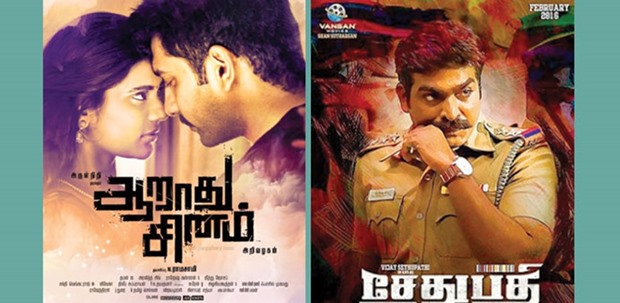Long years ago, that great master of mystery, Alfred Hitchcock, quipped that a film must be only as long as one can hold one’s bladder. And he made short and scary movies like Psycho, Vertigo and The Rope among others — films that might not have been as riveting had they been longer.
If this were to be true in the case of Hitchcock — whose brilliant scripts, extraordinary craft and amazing helming ability made him one of the greats in cinema — one can well imagine how lesser directors would fare, given their propensity for long, laborious narrative, often stretching well over three hours.
Happily, a change seems to coming over Tamil cinema. Many of the 30-odd movies released this year have been uniformly under two hours or just a little over it.
Arun Kumar, whose Sethupathi was 121 minutes, said in a interview: “I think the day is not far when there will be many films of 100-minute duration hitting the screens. This, I think, will be backed by exhibitors too, as they can screen five shows a day... It wasn’t a deliberate decision to keep Sethupathi short. Being a cop story, I wanted the movie to be crisp without force-feeding the audience with irrelevant scenes or elements. In spite of this, there were a few who opined that a song from the film could have been avoided,” he concluded.
Precisely so. Sethupathi could have been far more pulse pounding had the songs been excised. After all, why do you need songs in a cop-chase-culprit drama.
I am sure Sethupathi could have told us all that it had to in just 90 minutes if Kumar had done away with — in addition to the songs — those meaningless scenes meant to produce the so-called comic relief. Why do we need to be distracted from a nail-biting narrative by stupid jokes?
K J Venkat Ramanan, who edited Miruthan (less than two hours), made another valid observation. He felt that audiences might return to a movie if it was short. They might watch it for a second time if it is not long. “I feel keeping the duration of a film to two hours is a promising trend, and hence should be encouraged, as audiences these days, prefer narration of stories in a limited time frame. There have been instances where audiences find movies of even 180 minutes tedious,” he elaborated.
Ramanan added that that even directors had begun to shoot shorter footages. “I hardly ever get anything beyond 180 minutes, and this makes my job easier.” Probably, there is less of a dilemma here. What to cut and what to keep!
Sudha Kongara, whose Irudhi Suttru — Madhavan’s boxing bout — played for just 112 minutes, said that she had made a conscious decision to delate about 20 minutes from her movie, because she felt that they hampered the free flow of the plot.
I have always felt that a good director must be able to say a story in just 90 minutes, as Hitchcock so often did and with such finesse and effect. He kept his frames so tightly knitted that there was never a dull moment. This certainly heightened the suspense and thrill. But of course, Hitchcock had a set of excellent actors like Grace Kelly, Ingrid Bergman, Cary Grant, James Stewart, Gregory Peck and so on. What more could he have asked for?
* * *
Aarathu Sinam
Arivazhagan’s Aarathu Sinam had an excellent kick-off point in a story written by Jeethu Joseph — whose Drishyam in Malayalam was a huge hit that attracted remakes in Tamil, Telugu and even Hindi. Like Drishyam, Joseph’s Prithviraj-Sukumaran-starer, Memories, translated into a Tamil edition, Aarathu Sinam, a taut thriller, whose weak point seemed to be its over-indulgence in emotion — not quite the key word for a film in this genre.
However, some fine performances by the lead pair, Arulnithi and Aishwarya Rajesh (one remembers her as the boys’ mother in Kaaka Muttai), elevates Aarathu Sinam to a kind of cinema one doesn’t come across so often in Tamil.
Here is a drunken cop, Aravind, played by Arulnithi with consummate restraint — who turns to alcohol for solace when he loses his young wife (Rajesh) and daughter after a botched up encounter with a dreaded criminal.
Years later, Aravind is cajoled and coerced by a police commissioner (Radha Ravi) — who understands the pain and pathos of the young cop, as he does of his brilliant skills — to solve the case of a serial killer. The killer murders the husbands of four women and hangs their corpses in the way the crucified Christ is seen with his arms outstretched. Interestingly, the women share a secret that goes back to their days in an educational institute.
Arivazhagan’s script — at times impeded by unnecessary familial squabbles — takes us through the alleyways of a dark mind, deeply distressed by demeaning wrongs. But are they so humiliating for a man to turn into a monster?
We would never know, but it is here at this point in the plot that the film appears to totter a bit — much like the protagonist, who for most of his screen time is drunk. Can such a cop be capable of smart deductions, which sometimes seem uncannily close to those used by Sherlock Holmes — especially where Aravind concludes from the killer’s footprints that he must be physically disabled. But Holmes was addicted to cocaine, some would argue in defence of Aravind. Despite these hiccups, Aarathu Sinam sails through a thrilling terrain to a wow climax.
* Gautaman Bhaskaran has been writing on Indian and world cinema for over three decades, and may be e-mailed at [email protected]

The poster for Aarathu Sinam. Right: Arun Kumar’s Sethupathi was 121 minutes long, but could have benefited from even more cuts.
